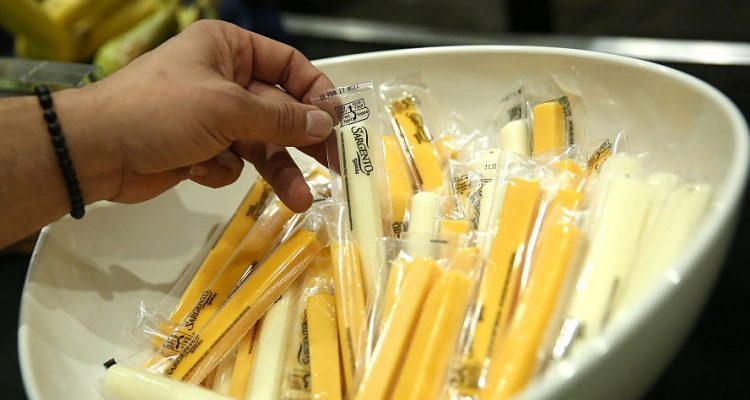
Sargento’s recall list has recently expanded with the addition of more packaged Sargento cheese slices. The American cheese producer has recalled seven more cheese products since February 10. About more than a week ago, Sargento Foods Inc. retracted some of its cheese products on the suspicion of Listeria contamination.
Complete List of Sargento Contaminated Cheeses
- Sargento Sliced Colby
- Sargento Sliced Muenster
- Sargento Sliced Pepper Jack
- Sargento Sliced Tomato & Basil Jack
- Sargento Shredded Reduced Fat Colby-Jack
- Sargento Shredded Chef Blends 4 Cheese Pizzeria
- Sargento Artisan Blends Double Cheddar Shredded Cheese
- Sargento Ultra Thin Sliced Longhorn Colby
- Sargento Chef Blends Shredded Nacho & Taco Cheese
- Sargento Sliced Colby-Jack Cheese
- Sargento Sliced Pepper Jack Cheese
- Sargento Chef Blends Shredded Taco Cheese
- Sargento Off The Block Shredded Fine Cut Colby-Jack Cheese
- Sargento Off The Block Shredded Fine Cut Cheddar Jack Cheese
The possibly-contaminated cheese products were supplied by Deutsch Kase Haus, LLC. Although no news of illness has been confirmed yet, Sargento has reportedly aborted all business relations with their supplier. The management team apologized for the inconvenience, and said that future products will be scrutinized more thoroughly for safety and quality purposes.
Consumers can check if their product is affected by the recall by visiting info.sargento.com and using the “Product Check” tool. The webpage will be updated with the latest information about the recall. Consumers can also call them at 1-800-243-3737 between 9:00 a.m. and 4:00 p.m. (Central Time), or submit questions under the “Contact Us” page at sargento.com.
What Is Listeria?
Listeria is a bacterial infection that is contracted by ingesting contaminated food. The resulting medical condition, called Listeriosis, can affect various parts of the body including the brain membrane, spinal cord membrane, and even the bloodstream. Listeria monocytogenes is a type of bacteria that is widely present in soil and water.
Listeria infection is quite common. In most cases, it occurs by food-borne transmission. The consumption of contaminated vegetables and animal products like unpasteurized milk and cold cuts can cause Listeria infection. Usually pregnant women, newborns, older people, or anyone with a weak immune system, chronic liver or kidney disease, diabetes, or alcoholism are susceptible to a Listeria infection.
The symptoms of Listeria infection may vary from person to person. In cases where the Listeria bacteria infects the brain or spinal cord membrane, symptoms may include sudden fever, intense headache, nausea, vomiting, and signs of meningeal irritation. Some symptoms of Listeria infection may resemble influenza-like symptoms as well.
The treatment of Listeria infection varies depending on the severity of the condition. Cases with a mild infection can improve without any medical treatment, while more serious Listeria infections can be treated with antibiotics.
Precautions against Listeria Infection
Since the Listeria bacteria is present in nature, basic sanitary measures like using only pasteurized dairy products, eating well-cooked meats, as well as washing hands, knives, and cutting boards thoroughly before preparing foods, can be helpful in curbing Listeria infection. Here are some other preventive measures to avoid the Listeria infection.
- Avoid cold cuts like hot dogs, luncheon meats, or deli meats, unless cooked well.
- Wash hands properly after handling hot dogs, luncheon meats, and deli meats.
- Prevent getting any fluids from hot dog packages on other foods, utensils, and food preparation surfaces.
- Refrain from refrigerated pâtés or meat spreads; instead go for canned or shelf-stable pâtés and meat spreads.
- Go for canned or shelf-stable smoked seafood instead of refrigerated, smoked seafood.
- Avoid soft cheeses such as feta, Brie, Camembert, blue-veined cheeses, or Mexican-style cheeses such as queso blanco and queso fresco, unless prepared from pasteurized milk.
Related:
- Latest Update on Major Foodborne Illness Outbreaks of 2017
- Latest Update on Listeria Recall June 2017
Sources:
Bennett, A., “If you have any of these cheeses in your refrigerator, you’ll want to get rid of them,” The News & Observer web site, February 19, 2017; http://www.newsobserver.com/news/business/article133711869.html, last accessed February 20, 2017
“More Products Added To Sargento Cheese Recall,” CBS Pittsburgh web site, February 19, 2017; http://pittsburgh.cbslocal.com/2017/02/19/sargento-cheese-recall-additions/,last accessed February 20, 2017
“Listeriosis (Listeria infection),” New York State Department of Health web site, October 2011; https://www.health.ny.gov/diseases/communicable/listeriosis/fact_sheet.htm,
last accessed February 20, 2017
“How does Listeria get into food?” MedicineNet web site; http://www.medicinenet.com/script/main/art.asp?articlekey=121587&page=2,last accessed February 20, 2017













